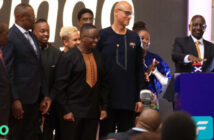Titled ‘Stylebender,’ the documentary showcases the UFC middleweight champion, Israel Adesanya, by revealing his frailty, his anxieties, and his problems, particularly when he ascends to a new level of prominence.
Isreal was born Israel Mobolaji Temitayo Odunayo Oluwafemi Owolabi Adesanya on July 22, 1989. He is a Nigerian and New Zealand professional mixed martial artist, kickboxer, and former boxer with multiple championships in all three disciplines.
Adesanya was born in Lagos, Nigeria, the eldest of five children.His father, Oluwafemi, is an accountant and his mother, Taiwo, is a nurse. Adesanya attended Chrisland School, Opebi, and enrolled in its Taekwondo after-school club until he was removed by his mother due to an injury. In 1999, he relocated to Ghana with his family for 10 months, but due to his parents wanting their children to receive a well-recognised higher education, he settled in Rotorua, New Zealand, at age 10 and attended Rotorua Boys’ High School.
After Stylebender (the documentary film that explores Israel Adesanya’s extraordinary life and noteworthy career to date) premieres at Tribeca Festival global, the mixed martial artist and UFC middleweight champion tweeted the following: “@Netflix please be the highest bidder for my documentary. Young men need to see this film.”
To make the movie, Adesanya and his core squad, lead by coach Eugene Bareman, were given extraordinary access by New Zealand filmmaker Zoe McIntosh. McIntosh spent more than a year immersed in Adesanya’s life and mind, and the result is a portrait that is both illuminating and exciting.
Adesanya, who scored his middleweight title win in 2019, gamely entered into some incredibly vulnerable spaces. The documentary delivers insightful information on the cost of celebrity, the toll success has on his mental health, and the addicting and frequently disruptive aspect of social media.
Adesanya previously discussed his split personalities while promoting the movie on the ImPaulsive podcast with Logan Paul in June, he said “We are men, we still have a feminine side and a masculine side, and I am in touch with both.”
Stylebender is set to open theatrically in New Zealand and Australia in late August,
McIntosh spoke with OkayAfrica over Zoom about getting into Adesanya’s head and deconstructing his complex personality for a worldwide audience.
On ensuring the documentary portrays a picture that does justice to the person whom the world feels some claim to:
“That’s a big question but I think, firstly, when I came on board in 2019, Israel wasn’t such a superstar, even though he was pretty well known. Now, there is so much noise about him. I knew that this documentary had to be different and revealing about his character, and new in fresh ways or it wouldn’t stand out. It was really important that I captured all facets of his character and really go deep with him in terms of showing his vulnerability, his fears and struggles especially around stepping up into that new level of fame.”
On how she came about the project:
I already knew about him in New Zealand. I was reading this glossy magazine article, and he was not only visually arresting — his style and the fighting moves that were photographed – but he was talking about being in touch with his feminine side, and being vulnerable and not being afraid to explore those aspects of himself. And to me that immediate contrast of a brutal fighter in a very macho world also talking about his femininity was absolutely intriguing. It so happened that that week producer Fraser Brown had hit me up asking if I was interested in directing this film on Israel, and I kind of leapt at the chance just because I already had some info about him.
But it wasn’t until I met up with Israel for dinner, just me one on one and I got a sense of his character, his charisma and his flaws and his eagerness to make a film that wasn’t just a sports documentary. It was really important for me that it was visually interesting, and explored his dance, as well as the fighting and was really deep and revealing of his character.
When asked how she communicates her vision for the film in the way that he understands it on a granular level:
“Right from the get-go, I said to him, ‘I do not want to make a usual fight film,’ so we were having conversations about how to make it different. The biggest one for me was when I found out he went to see a therapist. That kind of shifted gears for me, and I was like, ‘Now, we’ve got a film!’ And the fact that he was open to that was amazing. How I work is I usually do a lot of visual research and then I’ll lay it up scene for scene. In the opening scene, for example, we see him doing affirmations in the mirror or him lying in the bath with the flowers. I drew that out so I could sit down with him and share those ideas, and make sure there is going to be an authentic representation of him, and he was on board with it.”
On whether Adesanya is the same person today compared to when she started filming in 2019:
“I would say yes and no. I almost wonder if he’s come a little bit back to himself; to his younger, curious, playful self. I think he is in a really good space. Obviously, he’s leveled up, a superstar now and is more experienced in the UFC and his relationship with Eugene [has]grown, and is probably deeper because of this film. He is absolutely changed but I think he’s always going to be that young boy inside of him.”
READ ALSO: Overcoming Depression, Sadness, and Loneliness: A Counseling Perspective



